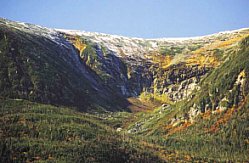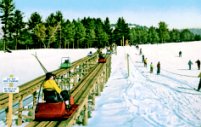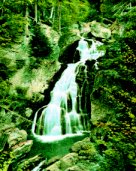Adventure in the White Mountains
|
Fifty years ago, no one
had heard of
"the Mt. Washington
Valley." Then this
area of the White
Mountains was known as
the "Eastern Slope
region." It wasn't until
the 1970s that through
the efforts of local
businesses and the
Chamber of Commerce
that the name, Mt.
Washington Valley, was
born. Townspeople and
visitors were quick to
embrace the new
identity, for in many
ways, it is Mt.
Washington that has
defined us in the
world's eyes.
Mt. Washington,
known for its weather
and observatory, its
unique vantage point as
the "top of New
England," and its unique
history. The name had
another effect, too: it
united the communities
in a new way with a
consciousness of shared
goals, values, problems
and opportunities, and,
most of all, a shared
future. |
 |
|
|
Chocorua |
Eaton |
Effingham |
Freedom |
Madison |
Snowville |
Tamworth |
|

|
These are the towns of
the Mt. Washington
Valley …off the beaten
path. There's Snowville
where sleighs were once
built; and
Eaton, where locals
gather for each wedding
in a church at the edge
of Crystal Lake. In
summer, sailboats skim
across Chocorua Lake in
Chocorua and Silver Lake
in Madison, while, in
winter, bobhouses dot
the ice and snowmobiles
and cross-country skiers
leave tracks in the
snow. There's so much
history here and in
nearby Tamworth, a town
where President Grover
Cleveland once summered
in style. Further south
are Freedom and
Effingham. The former is
a charming enclave of
white clapboard houses
and rolling farmland. In
sleepy Effingham,
country roads lead past
summer homes and classic
farms. |
|
|
Albany |
Chatham |
Conway |
Fryeburg, ME |
North Conway |
|
|
Conway and North
Conway are today the
best known towns of the
Mt. Washington Valley,
with good reason. Name
brand outlet shops,
lodgings, restaurants,
and attractions line
Main Street. While many
visitors find so much to
see and do right here
that they rarely venture
further, those that do
discover scenic drives,
routes to bike and hike,
swimming spots, streams
to fish, covered
bridges, farmer's
markets, Echo Lake State
Park, and the White
Mountain National
Forest. All are worth
the few minutes' trip
from the towns’ centers.
Two other towns well
worth exploring: Albany,
just south of Conway, is
primarily a residential
area; while Fryeburg,
Maine, just across the
border, is the home to a
variety of inns and
restaurants, and Maine’s
largest agricultural
fair. |

|
|
|
Bartlett |
Glen |
Intervale |
Jackson |
Pinkham Notch |
|

|
Of all the towns in Mt.
Washington Valley, it is
in Bartlett, Glen,
Intervale, and Jackson,
and along Pinkham Notch
that the presence of the
780,000 acre White
Mountain National Forest
is most felt.. Here you
are as likely to explore
the area on foot, skis,
or by horse-drawn wagon
as you are in the family
car. There's so much to
explore, too: popular
family attractions, golf
courses, sports and
recreation facilities,
village shops, charming
lodgings and some of the
area's best restaurants.
As popular as these
towns are in spring,
summer and fall, they
seem made for winter.
There are extensive
cross country trail
networks in Intervale,
Bartlett and Jackson,
back country trails
throughout the towns and
Pinkham Notch, plus
three major alpine
areas. |
|
|
Bretton Woods |
Crawford Notch |
Hart's Location
|
|
|
Look in any direction
along Route 302 as you
travel west from
Bartlett to Bretton
Woods, and you'll see
forest and mountains,
dwarfing Hart's
Location, which is so
small in population that
all its town meetings
are held in a private
home. Crawford Notch, a
State Park with six
miles of rugged natural
beauty, sparkling
waterfalls, scenic
outlooks and hiking
trails, is the gateway
to Bretton Woods. Once a
3400 acre private
preserve, today Bretton
Woods contains one of
the last of the state's
legendary grand hotels,
and a full complement of
recreational offerings
including golf courses,
a ski area, and the
world's first mountain
climbing railway… plus
mountains and forest as
far as the eye can see.
|
 |
|
Excitement and Relaxation Meet in the
Lakes Region
View the continuously updated web cam
(a view north
to the Whites from Moultonborough)
The Lakes Region: the name alone evokes
images of the blissful and lazy days of
summer…the joyous exuberance of a child,
knees to chest, cannonballing off a dock
into crystal clear waters…and of camps,
cottages and whole communities hugging
the water’s edge. There are 273 lakes
and ponds in the Lakes Region-Winnesquam,
Newfound and Squam are quite popular-but
one lake dominates it: 72-square mile
Lake Winnipesaukee, the largest lake in
the state.
Lake Winnipesaukee is the sixth largest
natural lake completely inside U.S.
borders. Eight towns border the lake:
Alton, Center Harbor, Gilford, Laconia,
Meredith, Moultonborough, Tuftonboro and
Wolfeboro. It covers 72 square
miles, is 28 miles long and 13 miles
wide, and has numerous islands; the
number is said to be anywhere from 230
to 274. The largest of these islands are
Long Island (1,186 acres), Bear Island
(780 acres), Cow Island (522 acres) and
Governor’s Island (504 acres).
Here the nation’s first summer resort
was created, and today
Wolfeboro remains a popular vacation
area; other communities-Meredith,
Laconia and Weirs Beach, and Gilford-are
every bit as popular.
Water, as you might expect, is a big
part of the fun here, from swimming and
fishing, to waterparks, cruise ships,
boat tours and nature centers. In winter
there’s ice fishing, ice sailing, cross
country and downhill skiing and
snowmobiling, too.
To
really get to know the Lakes Region, you
also should explore communities like
Sandwich, where the state’s crafts
organization was born; Wakefield, with
an impressive historic district; Melvin
Village, a favorite stop for antique
lovers; and Plymouth, home of Plymouth
State College and the Silver Cultural
Arts Center. Venture south to Rochester,
“the Lilac City” at the gateway to the
Lakes Region, or north to Madison and
Snowville, a sleepy hamlet where sleighs
were once made. |